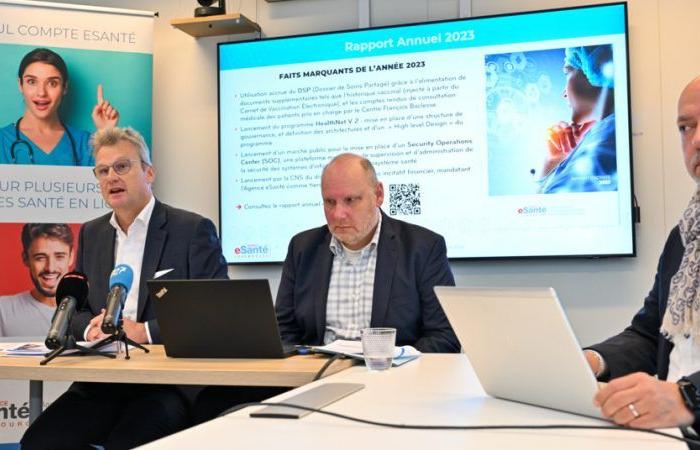After a mixed result in 2022, “eHealth” tools are increasingly used by Luxembourgers. Its spearhead, the shared care file, is experiencing a significant increase in its use.
The generalization of the digitalization of health continues in the Grand Duchy. Yesterday, the Luxembourg national agency responsible for facilitating the sharing and exchange of health data presented its activity report for the year 2023. First fact to note: the shared care file (DSP) is increasingly more used by Luxembourgers. This digital tool makes it possible to group together under the same platform medical reports, the results of medical imaging examinations and a patient's vaccination record.
For Marc Hostert, president of the management board of the eSanté agency, several reasons explain the increase in this use. “On the one hand, we observe that younger generations increasingly want to use IT resources to manage their health. On the other hand, the cessation of the reproduction of medical imaging on CD in 2024 and the generalization of digital hospital discharge letters have clearly had an impact on the adoption of this tool by health professionals.
If this tool appeals to young patients, older generations do not hesitate to take advantage of it. “We have maintained traditional channels for those who have little digital knowledge. We see that digital practice is becoming more common among people of a certain age who have unwell parents. For them, it’s a tool that makes their lives easier,” assures Marc Hostert. This change in approach developed during the health crisis four years ago. “During the covid period, we noted a drop in fear of digitalization of the health sector among patients. People began to get used to these tools and saw their positive effects in their daily lives.”
More than 200,000 patient accounts
This development of the digitalization of health is evidenced by the figures. As of September 30, 201,664 patients had an eSanté account. For the past month of September alone, 2,488 patients activated an account. Health professionals are not left out. As of September 30, 2,698 doctors, pharmacists or other practitioners had an eSanté account.
In detail, we observe that the number of shared care files reached one million in September 2024, i.e. more than the country's population, with cross-border workers likely to open one. Over the past year, the number of documents on this platform has continued to grow, reaching 13 million this year. In addition, the number of vaccination records is also increasing. In September 2024, the eSanté agency counted more than 45,000. This is almost 10,000 more compared to the month of October 2023.
The challenge of data security
But, faced with the development of the digitalization of health, one of the main challenges remains the protection of patient data. Aware of this problem and the risks of hacking, the president of the management board of the eSanté agency ensures that the process is very controlled. “We can say that it is a concrete system. With the National Commission for Data Protection (CNPD), we monitor this very closely to preserve the health data of our patients. This is something essential for us.”
This year, the eSanté agency launched two projects aimed at better protecting its interconnection network and the security of its information systems. A fundamental issue when we know that shared care files can be consulted outside the borders of Luxembourg, in particular for cross-border workers who have attended a health establishment in the Grand Duchy.
Towards a “new generation” DSP
During the presentation of its activity report, the eSanté agency also discussed its development areas for the future. First point: the extension of the accelerated reimbursement system for health payments. “We put it in place in 2023 and it will be extended for another year,” assures Marc Hostert. The system benefits patients who consult a doctor who participates in it.
But the main project of the eSanté agency remains the creation of a “new generation” shared care file. Concretely, this new DSP will make it possible to more easily exchange “data via PDF documents with Luxembourg’s neighboring countries”. “The other objective is to integrate a new technological version. The old platform was set up twelve years ago,” concludes the chairman of the management board of the eSanté agency.






